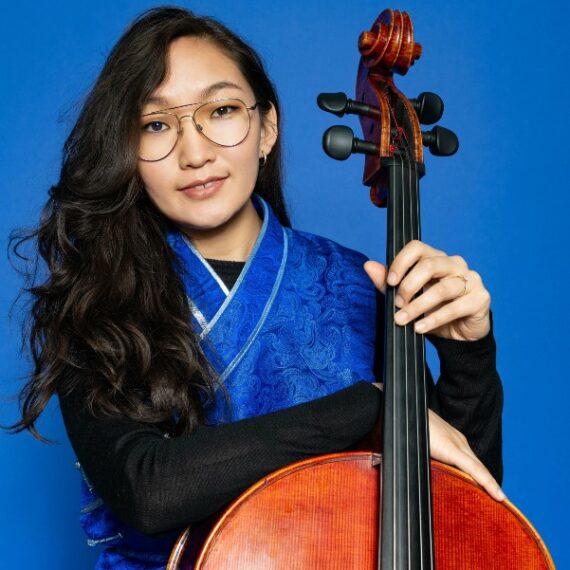Competitions
First Prize, 2014 Chuluun Strings Youth Competition, Ulaanbaatar, Mongolia; Third Prize, 2008 Youth Competition, Ulan-Ude, Russia; Third Prize, 2008 Munguntsetseg Chamber Music Competition, Ulaanbaatar, Mongolia; Special Prize, 2006 Chuluun Strings Youth Competition, Ulaanbaatar, Mongolia
Appearances
Section Cello, Mongolian State Philharmonic Orchestra, 2014–18; Concert Tour of musicians from Korea, Mongolia, and Russia in Seoul, Korea, 2015
What is your earliest memory of classical music?
My grandparents showed me how artists live and perform. My grandmother was a singer, and my grandfather played piano and accordion. My father was a clarinetist when I was young, though he later stopped playing.
Was there a teacher who was particularly impactful/helpful? What made this instructor stand out?
My cello teacher in Mongolia, Dariimaa Khamagnova, is the most amazing, kind, and thoughtful person I have ever known.
What made you decide to become a musician? Was there a particular performance or person that influenced your decision?
There was no choice. My grandparents and my father decided who would be the next family musician—that was me!
How did you hear about TŌN? What inspired you to apply?
I discovered TŌN in 2018 when my husband, Miigaa, was admitted to the program. Like him, I am an orchestral musician, and TŌN is one of the only orchestral programs in the United States that offers a Master’s Degree.
What is the most memorable performance you ever had?
Just 11 months after I gave birth to my son, I was soloist in the Saint-Saëns Cello Concerto with the Mongolian State Philharmonic Orchestra. My whole family and my teacher attended that concert.
What is your proudest achievement as a musician?
Being accepted into TŌN
Tell us about a time you almost gave up but didn’t.
It wasn’t easy, but I applied to this orchestra four times. Each time, I hoped that maybe this would be the time that I would finally make it. But after the third rejection, I started to lose hope. I thought maybe I wasn’t good enough, maybe I didn’t have what it takes. But then I remembered how much I loved playing the cello. I couldn’t imagine my life without it. So I encouraged myself to keep going, to keep practicing, and to keep trying. And finally, on that fourth try, I made it.
Can you share any memorable onstage mishaps?
I had a friend from school who was performing in an exam on stage. As he played his cello, he suddenly had a runny nose. Unfortunately, it ended up on his cello fingerboard, which caused his left fingers to slide. It was quite an unfortunate situation for him.
If you weren’t a musician, what would you be doing?
I would definitely consider pursuing a career as a nurse or a chef. Both professions involve helping others and making a positive impact, which are values that are important to me.
What is a surprising part of playing your instrument that you think most people don’t know?
Did you know that the cello is often considered to be the instrument that most closely resembles the sound of the human voice? It’s truly remarkable how expressive and emotional the cello can be in the hands of a skilled musician.
What is the biggest challenge and/or surprise about playing in an orchestra?
From my experience as a musician, I believe that one of the biggest challenges is having a true sense of empathy for my fellow musicians and conductors. When I’m playing in an orchestra, it’s essential that I’m completely focused on every single instrument and every person involved. Only then can we create the most beautiful music possible.
What advice would you give your younger self or anyone starting out?
Don’t give up! You can do it! Keep pushing forward and don’t let anything hold you back. Remember, every step you take is one step closer to achieving your goals. So keep striving and never give up on yourself!


